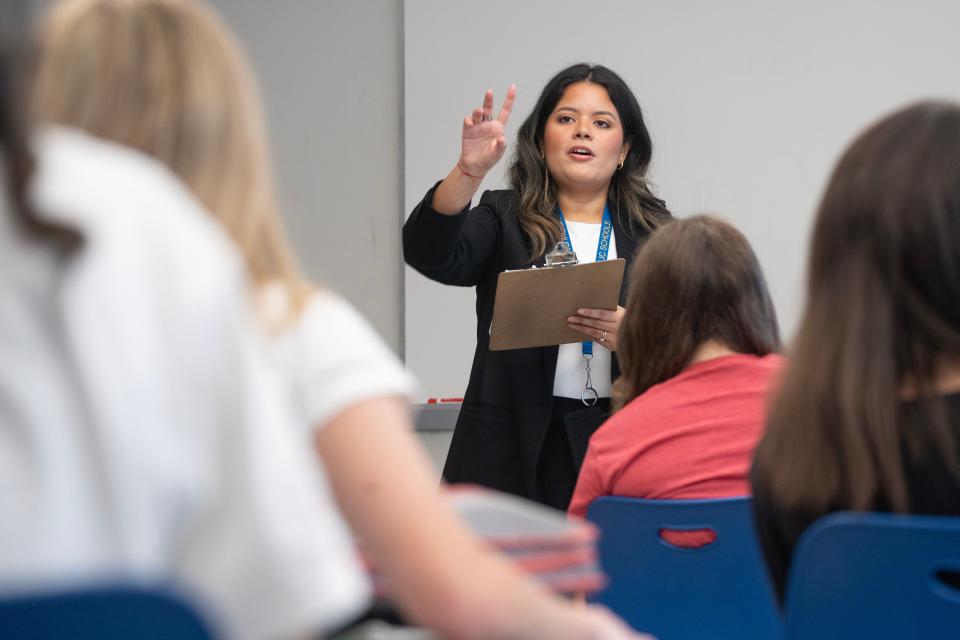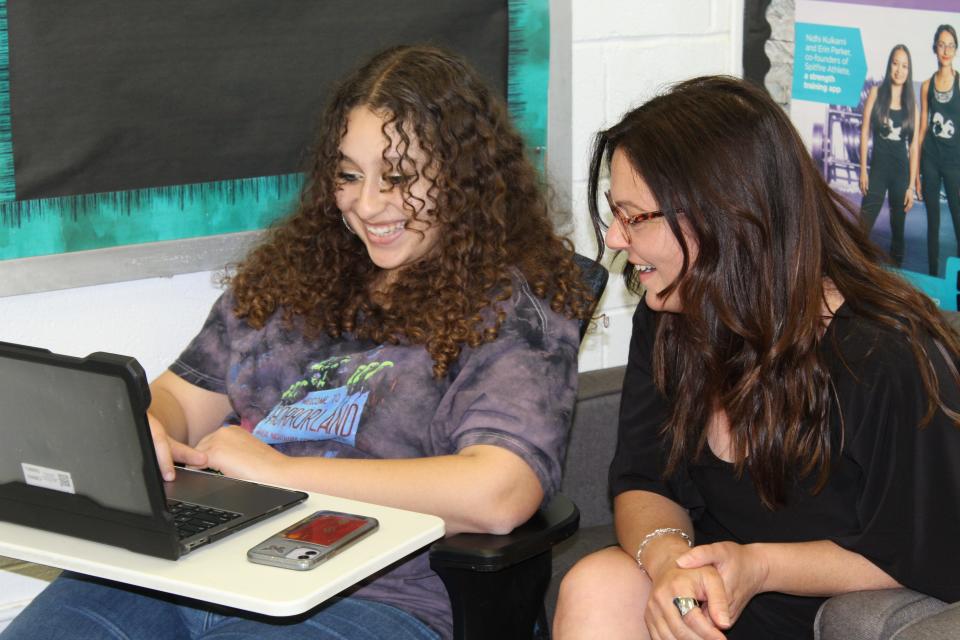Two North Jersey teachers of distinction receive annual Princeton University award
A game of "Trashketball" — answer a review question right and you get extra points for tossing a ball into a bin — kicked off a recent morning in Maria Maloupis’ English literature class. An eighth grader in the Lyndhurst Middle School classroom walked up to the whiteboard, turned, took aim and tossed a makeshift ball made of plastic bags into an empty black trash can.
A group of noisy but attentive teammates cheered their classmate on. “OMG we finally scored! We’re tied for second!” said one student. Their teacher grinned.
Maloupis, one of four public school teachers who won this year's Princeton Prize for Distinguished Secondary School Teaching, awarded by Princeton University, had always known she wanted to teach kids — provided she was also doing something with books. “I always loved reading and writing. I always wanted to share it with other people and talk about books all day,” she said.

“Empathizing” with her students and “seeing them as full human beings” is the secret behind the easy yet productive engagement she elicits from the class. “I like the age group,” she said of middle schoolers, whom experts call the more sensitive end of adolescence.
Making the rounds among the four teams of students who alternately complained, laughed and couldn't wait for the next question, Maloupis was calm and nonplussed by their banter and energy. “This is when they seem to have the most potential,” she said of the teens.
Pause ending: Here's when federal student loan repayments will likely restart this summer
With a teaching degree in English from Montclair State University, the Hasbrouck Heights native started her career seven years ago in Lyndhurst Public Schools.
Pascack Valley high school teacher also a winner
Pascack Valley Regional High School’s Nancy Ricca, a self-taught C++ programmer, also won the Princeton Prize this year, for developing "rich lessons and experiences" for her students. Ricca teaches math and coding in grades nine through 12. The school credits her for building up the computer science department from scratch while also running clubs like Girls Who Code and designing innovative ways to draw students to coding.

Two other teachers, Wahab Ashraf, an AP Biology teacher at a Newark magnet school and Bob Fenster, a history teacher in Hillsborough High School, also won the Princeton Prize this year.
From Ecuador to the New York City
Ecuadorean-born Maloupis was 9 years old when she began learning English as a second language in New York City’s public schools after her parents, who she says were avid readers, moved the family to the U.S. from Ecuador. A fourth grade teacher of English as a second language planted a seed that grew into a love for literature and was Maloupis’ inspiration to become a teacher herself.
She remembers that books were her refuge when she first arrived in the U.S. “When I came here, I became very shy because I did not speak the language," she said. "I turned to books very naturally.”
Her elementary ESL teacher coaxed her to read more by starting out with such books as Eric Carle's "The Very Hungry Caterpillar." Having fun while reading was key to those early lessons, said Maloupis. "She would make me feel very comfortable, very accepted. We would sing songs."
The Princeton prize committee noted a similar quality in Maloupis, noting comments made by a former student of hers. “I felt like I could always talk to her, and she would be there to guide me through school and life," the student said. "She always listens to you, which is sometimes all you need."
How the awards are decided
Princeton University’s prizes honoring middle and high school teachers “represent the finest secondary teachers in the state” and are awarded annually through its 64-year-old teacher preparation program, which grants certificates in middle and high school teaching.
“What sets these teachers apart is the impact that they have on students, and their impact on the school community,” said Todd Kent, director of Princeton's Teacher Preparation program. In addition to looking for exceptional teachers, the prize selection committee looks for individuals who are “leaders" in their schools.
“There’s no magic formula. We look at each teacher in the context of their teaching. We look at the whole picture," he said, about the criteria for the prize. “Every teacher is unique, and every teacher is in a unique context. We’re looking at teachers who work in underserved communities and we’re looking at teachers in some of the best private and public schools in the state."
Applicants are nominated by their school administrators, and program staffers review the applications in the fall. A staff member from the Princeton teaching program visits the classrooms of the 10 finalists, and awardees are picked in April by a selection committee consisting of Kent, Princeton faculty members and a public school principal.
Winners are dressed in full regalia and honored with a citation during the university’s commencement exercises, which this year are May 30. Each winner receives a $5,000 check and a $3,000 gift to the school library. The prize is funded by an anonymous gift from an alumnus.
Advocates for more students to learn coding
Ricca, a Totowa resident, teaches four classes at Pascack Valley High. She was the only computer science teacher in the high school when she started out, and now is one of three. Ricca said she has advocated to have more students learn coding since she began teaching math at the high school 24 years ago.
She taught her first class in C++ programming in 2000 at the school's request, teaching herself the language before bringing it to her students. “I had to teach myself," she said. "I was literally two weeks ahead of the kids, teaching myself while teaching my students how to code. But I fell in love with it.”

Ricca got her undergraduate degree at William Paterson University and a master's from Montclair State University. During the summer, she plans to pursue a certificate in teaching cybersecurity.
How does she engage students in coding courses that intimidate so many? “We have fun," she said. "I try to bring in the creative aspect of computer science and show the students how CS education goes along with any education right now … and all the different types of fields out there.”
Students in her AP Computer Science class will host a "game day" on June 6 during lunch. “A few of my students coded bingo animations, so they’re all going to be playing bingo,” she said.
“The kids have a lot of choice, and she sets the parameters,” said Ricca’s colleague Paul Zeller.
This article originally appeared on NorthJersey.com: Lyndhurst and Pascack Valley NJ teachers win Princeton award

